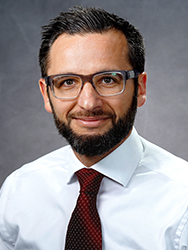March is National Kidney Month. With the recent news of New Jersey Governor Phil Murphy’s successful surgery to remove a tumor on his kidney, we reached out to urologic oncologist Jeffrey J. Tomaszewski, MD, and medical oncologist Robert A. Somer, MD, both with MD Anderson Cancer Center at Cooper, to discuss common questions about kidney cancer, from surgical recovery through cancer survivorship.
What should we know about kidney cancer risk factors and detection?

Robert A Somer, MD
Dr. Somer: Kidney cancer is one of the top 10 most common cancers in both men and women. Men have nearly a two times greater risk for developing kidney cancer compared to women. Other risk factors include smoking, being overweight, high blood pressure, certain chemicals and medicines, having kidney disease such as being on dialysis, and family history or genetic causes. There are approximately 73,752 cases of kidney cancer expected to be diagnosed in 2020, with just under 15,000 deaths attributable to kidney cancer per year. As such, most people will do quite well after the diagnosis and surgery.
Dr. Tomaszewski: Most patients with kidney cancer do not have symptoms at the time of presentation, and we do not routinely screen for kidney cancer. Symptoms can occur with more advanced disease, and include flank pain, blood in the urine, unexplained weight loss, and bone pain. Typically, most kidney tumors are detected incidentally when people undergo imaging tests for other purposes, as was the case for Governor Murphy.
How is kidney cancer treated?

Jeffrey J Tomaszewski, MD
Dr. Tomaszewski: Most kidney cancers are treated surgically, and the overwhelming majority can be cured from surgery alone. We don’t know the details of Governor Murphy’s surgery, but for early stage localized tumors, kidney-sparing surgery is frequently performed. The ability to save kidney tissue and thereby preserve kidney function depends on tumor location and anatomic complexity. Over the past 10 years, surgeons have been increasingly using robotic and minimally invasive and robotic surgery for these types of cancer and have seen dramatic improved in outcomes. Most patients go home after an overnight stay, and can be back at work in two weeks. In the past, surgeons performed more invasive or “open” kidney surgery when oftentimes a rib was removed and the incisions were quite large. Patients undergoing robotic surgery have far less pain, less blood loss, and shorter recovery. Most of our patient are out of bed and walking the day of surgery! In some cases, we are now even able to perform complex kidney sparing operations through a small single incision, with fewer surgical scars and improved outcomes.
At MD Anderson Cancer Center at Cooper, we also employ an enhanced recovery after surgery (ERAS) program, which is a streamlined post-operative recovery pathway that minimizes the use of potentially addictive narcotic pain medications. Our ERAS program helps patients recover faster and return home more quickly.
In order to preserve kidney function in cases of highly complex kidney tumors, MD Anderson at Cooper is currently the only center in the region utilizing 3D printed kidney replicas to improve the likelihood of kidney preservation. An exact printed 3D kidney model can be made from patient MRI or CT scan images, and this model can then be used to perform a simulated operation, allowing surgeons to “practice” the procedure. We are currently studying whether this approach allows more kidney tissue to be preserved during kidney sparing surgery.
What could be expected after a kidney cancer tumor removal surgery?
Dr. Somer: Now that Governor Murphy’s cancer has been removed, he will need to be monitored carefully with follow-up medical appointments, blood work, and periodic scans looking for the potential for recurrence. A typical follow-up schedule is individualized based on the kidney cancers risk of recurrence. The range could be visits every three months to every 12 months with repeat imaging periodically. He will be monitored for signs or symptoms of recurrence such as unexplained weight loss, new pain, blood work abnormalities, and fatigue not otherwise specified. Following a cancer diagnosis, it is important to live a healthy lifestyle, limit tobacco use, limit alcohol use, and stay active. It is critical for our survivors to “know their body” and report any new symptom to their provider.
When it comes to fighting cancer, you want the best team by your side. Today, at MD Anderson Cancer Center at Cooper, you have access to the most advanced cancer care. Learn more about kidney cancer and your treatment options by visiting our website.
